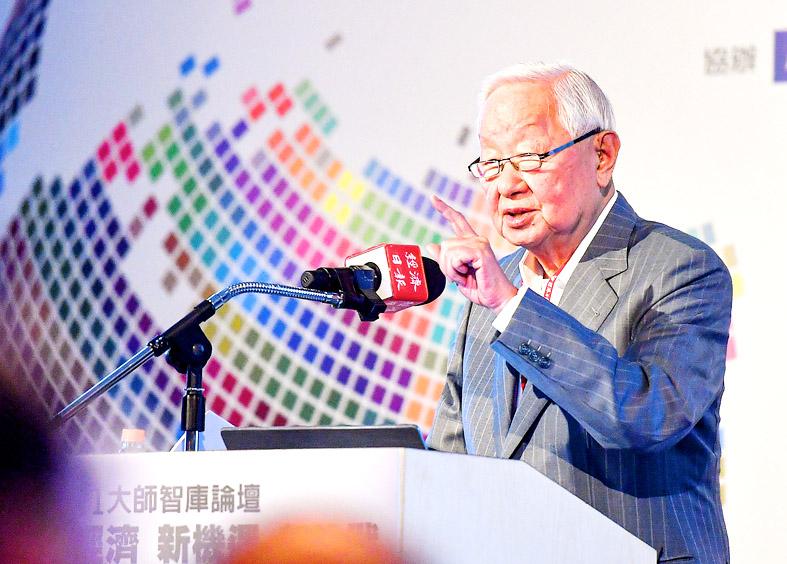Taiwan still leads the US and China in chipmaking, but it would be difficult for another local company to duplicate the success of Taiwan Semiconductor Manufacturing Co (TSMC, 台積電), the firm’s founder, Morris Chang (張忠謀), said on Wednesday.
Speaking at a seminar on Taiwan’s competitiveness in chip production, the 89-year-old Chang said that Taiwan’s talent pool of quality engineers, technicians and factory workers is the main reason it has excelled in the semiconductor foundry business.
Another factor is Taiwan’s transportation network, which allows large and quick transfers of personnel in the country, he said at the seminar hosted by the Economic Daily News.

Photo: CNA
Chang, who retired from TSMC in 2018, also lauded the company’s professional managers, saying their leadership and devotion to research and development, coupled with workers’ efforts, and government and local support, had helped TSMC evolve into a world-class company.
The US, on the other hand, saw a decline in manufacturing decades ago, and has been focusing instead on research and development, and the financial sector, he said.
Although the US government has been increasing funding for its semiconductor industry, Chang said that he is not worried, because production costs are significantly higher in the US than in Taiwan.
Short-term federal and state subsidies would do little to reverse the US’ competitive disadvantage in the long term, he said.
China has spent tens of billions of dollars over the past 20 years to nurture its domestic companies, but their semiconductor manufacturing process lags behind TSMC’s by at least five years, and their logic IC design is also one to two years behind that of Taiwan and the US, he added.
Samsung Electronics Co is TSMC’s only strong competitor, because South Korea also has a vibrant manufacturing sector and a competitive talent pool similar to Taiwan’s, he said.
Despite Taiwan’s advantage in the semiconductor industry, it would not be easy for another domestic firm to duplicate TSMC’s role as the world’s leading dedicated semiconductor foundry and a protective shield that underpins Taiwan’s economy, Chang said.
“It will be difficult” to find another company that is so important to the rest of the world and holds such a large global market share and competitive edge, he added.
Founded in 1987 by Chang as a chip foundry business, TSMC has become enormously important, as the global information technology sector is highly dependent on its products.
It has been called a “protective sacred mountain” for Taiwan against China, amid Beijing’s technology dispute with Washington.
Semiconductor wafer manufacturing is extremely important to people’s livelihood, the economy and national defense, Chang said.
Last year, TSMC’s market capitalization topped US$600 billion, the highest among semiconductor companies.

Nvidia Corp chief executive officer Jensen Huang (黃仁勳) on Monday introduced the company’s latest supercomputer platform, featuring six new chips made by Taiwan Semiconductor Manufacturing Co (TSMC, 台積電), saying that it is now “in full production.” “If Vera Rubin is going to be in time for this year, it must be in production by now, and so, today I can tell you that Vera Rubin is in full production,” Huang said during his keynote speech at CES in Las Vegas. The rollout of six concurrent chips for Vera Rubin — the company’s next-generation artificial intelligence (AI) computing platform — marks a strategic

SEMICONDUCTORS: The German laser and plasma generator company will expand its local services as its specialized offerings support Taiwan’s semiconductor industries Trumpf SE + Co KG, a global leader in supplying laser technology and plasma generators used in chip production, is expanding its investments in Taiwan in an effort to deeply integrate into the global semiconductor supply chain in the pursuit of growth. The company, headquartered in Ditzingen, Germany, has invested significantly in a newly inaugurated regional technical center for plasma generators in Taoyuan, its latest expansion in Taiwan after being engaged in various industries for more than 25 years. The center, the first of its kind Trumpf built outside Germany, aims to serve customers from Taiwan, Japan, Southeast Asia and South Korea,

REVENUE PERFORMANCE: Cloud and network products, and electronic components saw strong increases, while smart consumer electronics and computing products fell Hon Hai Precision Industry Co (鴻海精密) yesterday posted 26.51 percent quarterly growth in revenue for last quarter to NT$2.6 trillion (US$82.44 billion), the strongest on record for the period and above expectations, but the company forecast a slight revenue dip this quarter due to seasonal factors. On an annual basis, revenue last quarter grew 22.07 percent, the company said. Analysts on average estimated about NT$2.4 trillion increase. Hon Hai, which assembles servers for Nvidia Corp and iPhones for Apple Inc, is expanding its capacity in the US, adding artificial intelligence (AI) server production in Wisconsin and Texas, where it operates established campuses. This

Garment maker Makalot Industrial Co (聚陽) yesterday reported lower-than-expected fourth-quarter revenue of NT$7.93 billion (US$251.44 million), down 9.48 percent from NT$8.76 billion a year earlier. On a quarterly basis, revenue fell 10.83 percent from NT$8.89 billion, company data showed. The figure was also lower than market expectations of NT$8.05 billion, according to data compiled by Yuanta Securities Investment and Consulting Co (元大投顧), which had projected NT$8.22 billion. Makalot’s revenue this quarter would likely increase by a mid-teens percentage as the industry is entering its high season, Yuanta said. Overall, Makalot’s revenue last year totaled NT$34.43 billion, down 3.08 percent from its record NT$35.52